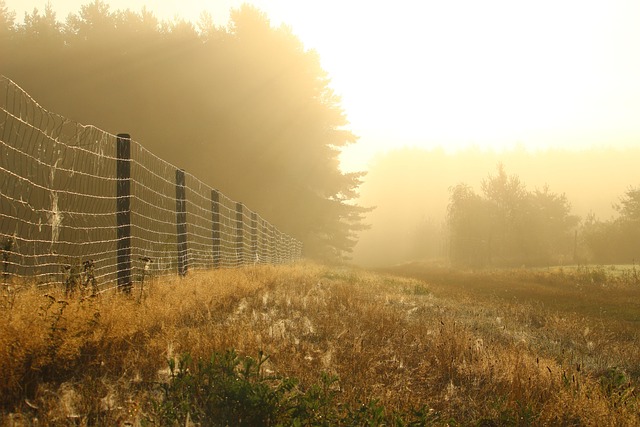In New Bedford, Massachusetts, where diverse seasons demand adaptability, proper fence maintenance is crucial for both functionality and aesthetics. This comprehensive guide navigates the specific challenges posed by New Bedford’s climate, offering essential rituals for annual cleaning and meticulous inspection. We delve into identifying and mitigating damage from rot, rust, and other environmental factors, while also providing storage tips to ensure longevity. Additionally, we explore material choices and tap into insights from local experts, empowering homeowners to maintain their fences effectively.
- Understanding New Bedford's Climate for Fence Maintenance
- Annual Cleaning and Inspection Rituals
- Repairs: Rot, Rust, and Damage Assessment
- Seasonal Storage Tips for Longevity
- Choosing the Right Materials for Your Fence
- Local Experts: Professional Care Recommendations
Understanding New Bedford's Climate for Fence Maintenance
New Bedford, Massachusetts experiences a diverse range of weather conditions throughout the year, from hot summers to cold winters and blustery coastal storms. This varying climate plays a significant role in fence maintenance. Understanding the local conditions is crucial for homeowners to ensure their fences remain in good condition. During the summer months, high temperatures and humidity can accelerate wood decay, while winter’s freezing temperatures and frequent snow can put stress on fencing materials. Additionally, New Bedford’s exposure to Atlantic coastal storms brings strong winds and heavy rainfall, which can cause significant damage if fences aren’t properly maintained or secured. Regular inspection and maintenance, especially during these extreme weather fluctuations, are essential to preserving the integrity of any fence structure.
Annual Cleaning and Inspection Rituals
Annual Cleaning and Inspection Rituals
For New Bedford, Massachusetts property owners, incorporating regular cleaning and inspections into your seasonal fence maintenance routine is a must. Start by removing any debris, such as leaves, twigs, or branches, that may have accumulated over the winter months. This not only improves the aesthetic appeal of your fence but also prevents potential damage caused by rotting plant material.
Next, give your fence a thorough wash using mild soap and water to remove dirt, grime, and any remaining debris. After cleaning, inspect it for signs of wear and tear, such as loose or damaged boards, rusted hardware, or rot. Addressing these issues promptly will help extend the life of your fence and ensure it remains functional and safe.
Repairs: Rot, Rust, and Damage Assessment
Fences are an essential part of property boundaries and aesthetics in New Bedford, Massachusetts, but they require regular maintenance to withstand the changing seasons. Repairs are a crucial aspect of seasonal fence maintenance, addressing issues like rot, rust, and damage. Homeowners should perform a thorough inspection to identify any signs of deterioration or weak spots. Rot, often caused by excessive moisture and lack of ventilation, can weaken wooden fences, leading to warping or splitting. Rust is another common problem for metal fences, especially in regions with high humidity, causing joints to loosen and surfaces to become brittle.
Assessing damage includes checking for broken boards, sagging rails, or any visible signs of impact from vehicles or animals. Over time, fences may settle unevenly due to soil compaction or changes in weather patterns, leading to misaligned posts and damaged brackets. Regular repair work ensures the structural integrity of the fence, prevents further deterioration, and maintains the overall appearance of the property.
Seasonal Storage Tips for Longevity
To ensure your fence remains in top condition and lasts for years to come, proper seasonal storage is essential. During the colder months, when frost and snow are prevalent in New Bedford, Massachusetts, it’s crucial to prepare your fence for hibernation. Begin by cleaning the fence thoroughly, removing any debris or leaves that might accumulate over the winter. Next, dry the fence completely before applying a protective coat of sealant or paint to shield it from the elements. This step is vital as it prevents water damage and corrosion.
For storage, disassemble any removable parts like gates or lattice panels if possible. Wrap each section individually in waterproof plastic sheeting to keep them safe from moisture and ice. Store these components in a dry, secure area, such as a garage or shed. For fences made of metal or wood, consider using specialized storage bags designed for outdoor furniture or large items. These bags provide an extra layer of protection against dust, pests, and UV rays, ensuring your fence is ready to be put back up come spring.
Choosing the Right Materials for Your Fence
When it comes to choosing fence materials, consider factors like weather conditions and local aesthetics. For New Bedford’s seasonal fluctuations, opt for durable materials that can withstand both harsh winters and hot summers. Wood is a popular choice due to its natural appeal but requires regular treatment to protect against rot and insect damage. Alternatively, vinyl fencing is low-maintenance, resistant to fading, and offers a wide range of styles. Metal fences are also durable and provide security, but they can be more prone to corrosion in humid climates.
Local building codes and neighborhood associations may have guidelines on fence materials and heights, so ensure your selection complies with these regulations. The right material choice will not only enhance the curb appeal of your property but also provide long-term functionality, saving you from frequent replacements.
Local Experts: Professional Care Recommendations
In New Bedford, local experts recommend a year-round approach to fence maintenance for optimal performance and longevity. During the spring, inspect your fence for any damage incurred during winter storms or freezing temperatures. Repair or replace damaged sections immediately to prevent further deterioration. A professional pressure wash in late spring can effectively remove built-up dirt and debris, preparing the fence for the growing season.
For summer maintenance, experts suggest regular cleaning and painting to protect against fading and rust. In autumn, address any loose or broken boards promptly to maintain privacy and security. Before winter sets in, treat wooden fences with a water-repellent sealer to safeguard against moisture damage. These simple steps, guided by local expertise, ensure your New Bedford fence remains in top condition throughout all seasons.
